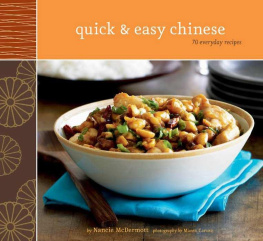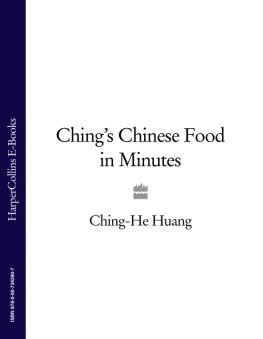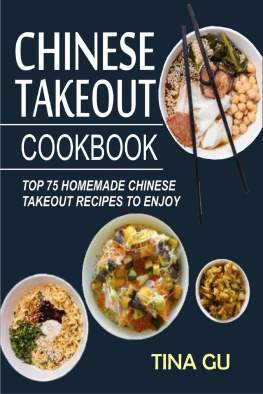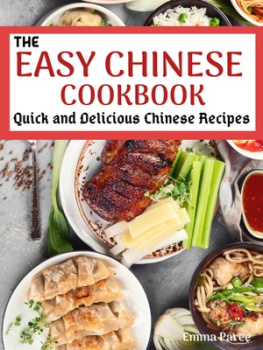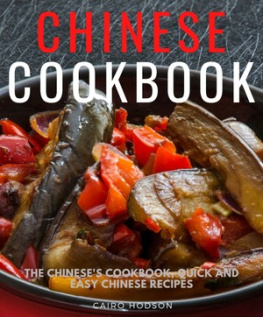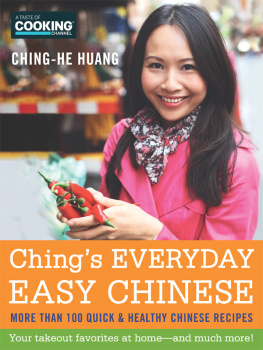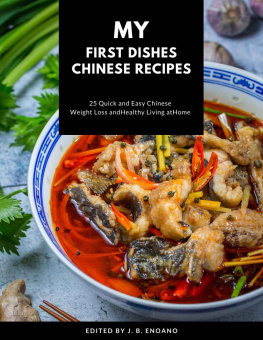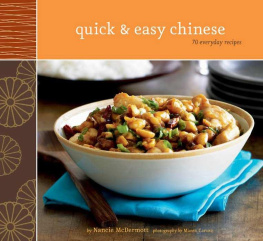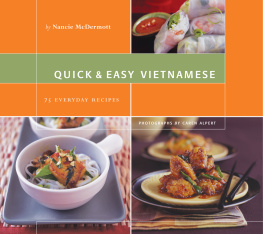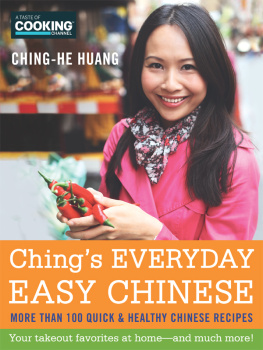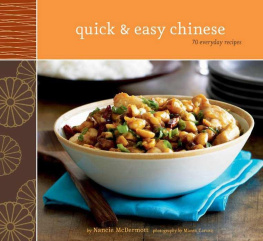quick & easy chinese
quick & easy chinese
70 everyday recipes
by Nancie McDermott photographs by Maren Caruso

Dedication:
To the memory of Dr. Ting-Chien Lee, (19231985). Through his work as a pediatrician, scientist, scholar, and teacher, he made this world a better place. Through his example as a son, brother, husband, father, and friend, he showed his family and community how to live with generosity, wisdom, and love.

Acknowledgments:
Ten thousand thanks to the brilliant team at Chronicle Books: Bill LeBlond and Amy Treadwell who said yes and saw things through with patient wisdom; Peter Perez and Amy Portello who put my books into the limelight and kept them there; and Jennifer Tolo Pierce whose extraordinarily beautiful design illuminates this book. Photographer Maren Caruso and her team brought the recipes to life handsomely through their excellent work. Sarah Baurle, Jane Falla, and my literary agent Lisa Ekus-Saffer continue to work thoughtfully and tirelessly on my behalf. My beloved friends Jill OConnor, Dean Nichols, and Debbie Gooch keep me laughing and looking ahead, and my husband Will Lee and daughters Camellia and Isabelle feed my heart and soul every single day.
TABLE OF CONTENTS
INTRODUCTION
Its another way-beyond-busy weeknight, and all across the land, many a would-be cook reaches out for two things: the telephone and the take-out menu for ordering Chinese. Its fast, handy, satisfying, and more varied than pizza, and if youre lucky, it can be delivered to your door.
We enjoy going out to eat Chinese food too, whether were seated in a local mom-and-pop restaurant, a glittering dim sum palace, or a plush temple of haute cuisine Chinoise. Chinese takeout fills us up at lunch and dinner and serves as a mealtime staple on the way home from work. Enamored of delicacies such as won ton soup, mu shu pork, kung pao chicken, and orange beef, and blessed with abundant and varied sources for it, we are a people in love with Chinese food.
Our appreciation for Chinese food is so strong that a new generation of Chinese eateries has joined the marketplace in the last decade, serving up a Chinese-inspired take on fast food. Visit the food court at any major shopping mall or airport, and youll find multiple counters serving generous portions of dishes many Chinese people would not recognize. Meat and veggies are napped in delightfully flavorful sauces, creating delicious hybrids that we mall rats love. Major upscale chain restaurants are thriving as well, some serving pan-Asian menus and others offering their version of traditional Chinese cuisine.
Clearly we love Chinese food, and we partake of it in its various incarnations all across the land. The place we need to see it next is on our own kitchen tables. Wonderful Chinese dishes belong among the basic weeknight repertoire of the everyday cook, but right now you seldom find them there. Chinese cooking is often considered adventurous, ambitious, possibly admirable, but most of all, daunting and hard. Many a good cook has taken it up and gotten into it, but eventually the wok ends up in the garage and the dozen bottles of sauces skulk in the back of the fridge.
Quick & Easy Chinese is about cooking delicious Chinese dishes using ingredients you can easily find, tools you probably have, and the kind of time you can reasonably spare to make dinner at home. China being a rather large country with an abundance of people, climates, cultures, and cuisines, it makes sense, to me, to start small, with a reasonable, noble goal. The goal of this book is to share the everyday ways that I cook wonderful Chinese food at home for my family and friends, even on a busy day.
Bringing Chinese cooking home makes sense today. Access to traditional ingredients has never been better, with once-exotic sauces and condiments, fresh and dried noodles, and an abundance of gorgeous and good-for-you vegetables easily found around the country. Traditional cooking equipment is widely available, not that home cooks need anything fancy to cook everyday Chinese food. Stir-frying works beautifully in a large, deep skillet, and a good chefs knife does the chopping if a cleaver isnt among the batterie de cuisine.
To bring Chinese cooking home, it makes sense to focus on Chinas home cooking, the way literally millions of Chinese people cook in ordinary or even modest kitchens, every single day. Hong Kong seafood is fabulous, hand-tossed noodles are astounding, and dim sum parlors are a hoot, but none of these Chinese culinary experiences have much to do with a family cooking and eating dishes to go with rice. Starting with home cooking, Ive worked out versions of traditional dishes that are simple, straightforward, and accessible to everyday cooks in the West, because that is exactly what they are within Chinese cuisine.
Here you will find recipes for Chinese dishes that are delicious and doable. My choices reflect the breadth and complexity of Chinese cooking, with dishes from Chinese home kitchens in the city and in the countryside; from overseas Chinese communities in Asia and in the West; from Singapore, Hong Kong, and Taiwan; and from the Chinese American restaurant repertoire, which was my first introduction to this extraordinary cuisine.
Like the land from which it grew, Chinese cooking is a big, bold, complicated, endlessly varied, mysterious, intriguing, and fascinating subject, full of detail, contradictions, and lore. Chinese restaurant menus bulge with edible offerings, but not every beloved Chinese dish is in this book. There are two reasons for not including them all. First, I adore going out for Chinese food. I love the round tables, the energy, and the chance to share dishes rather than choosing one entre during a restaurant meal. Second, many classic Chinese restaurant dishes are beyond the scope of most home cooks, even in China. Sizzling rice soup, whole fish steamed or fried, Peking duck, and honey-coated apples are a few of the not-quick-and-not-easy dishes well worth the journey to a Chinese restaurant.
Going out for Chinese food puts me and my family in a boisterous room full of happy people, feasting on an abundance of tasty dishes. Chinese people consider eating out a basic component of culinary life. They love dining out in restaurants plain and fancy, and they delight in picking up food to go from street vendors and food stalls. But what Chinese people still do, every day, all around the world, is cook simple, wonderful Chinese food at home. So do I, and so can you.
My wish for you is that this book guide you toward putting delicious Chinese dishes on your table, for your own delight and for people you enjoy. I hope that you enjoy shopping for the ingredients, chopping them up, and catching the aroma of garlic and ginger as they sizzle in the pan, and that as you toss and season and ladle out these dishes, you cook up lots of good times with family and friends.
EQUIPMENT & TECHNIQUES
When teaching my students about Chinese cooking, the quintessential message I present is to focus not on the first word, Chinese, but on the second word, cooking. Certainly even a small aquaintance with Asian cuisines shows that there is a world of difference, but the basic aspects which matter in home cooking are universal kitchen truths, useful anytime and anyplace you cook.
The key to happiness and good results in most cuisines, but particularly Asian cooking, is good knife skills. Knowing how to hold and use a good knife is extremely helpful to you in the kitchen. While books can convey many culinary techniques, knife work calls for observation and practice and ideally instruction from a person who knows knives as the primary kitchen tool. Look for classes at cooking schools in your area, within culinary arts programs at professional culinary schools, or in culinary arts programs at community colleges and technical institutes. Or talk to chefs and cooks in restaurants where you enjoy eating and see if you can work out a trade (perhaps your famous chutney, spiced almonds, or pound cake in exchange for a session of instruction in knife skills).
Next page
